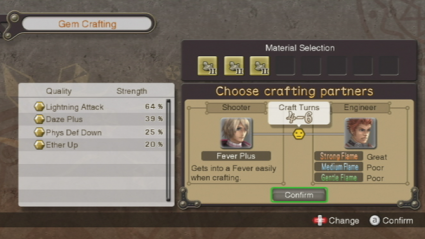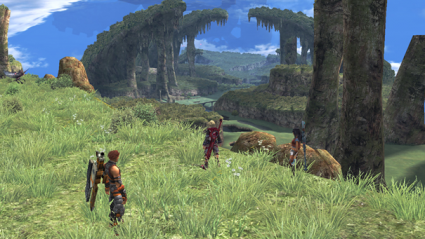Editorials
Jaded Perspectives and Xenoblade Chronicles
September 26, 2012, Author: Adam Boffa
In the months since Xenoblade Chronicles’ release, critical consensus has started to form and many have argued, elegantly and intelligently, for its strengths. Its position as the rightful heir to the throne of the Chrono Triggers and Final Fantasy VIIs of the world seems obvious to its supporters.
I will be blunt: I am not nearly as convinced. I find many of its gameplay choices perplexing, and at times think it may be stuck in some sort of game design timewarp. In spite of all of my issues with the game, however, Xenoblade Chronicles filled me with a sense of wonder and excitement that few other games have in recent memory, and my experience with it gave me reason to reconsider my natural-born cynicism. Xenoblade won me over.
Playing Xenoblade can be overwhelming in any number of ways, though. It aims to modernize the classic JRPG formula by streamlining combat without abandoning its turn-based roots (somewhat similar to Final Fantasy XII) and by adding more open-world exploration.
Both of these are noble goals, but the result is a game with an immense amount of different gameplay systems. The first ten or fifteen hours are a gradual onslaught of tutorials, informing you that no, you should not sell those items you found just yet, as you can use them in equipment customization; but first those items themselves can be customized for better effect; but not until you’ve decided how you would like to specialize your character’s abilities; which can, by the way, be augmented by abilities from a party member, whose relationship with you involves a set of events and statistics which affect things like combat; which has its own set of systems to determine all sorts of different variables, as different attacks have different properties, and there is an important hierarchy to understand when choosing where and when to attack or defend; but don’t forget to keep track of your encyclopedia of collectibles in each area. This rabbit hole seems infinite until you finally turn the console off and try to determine which choices in your life led you here.
I am being intentionally obnoxious, but the truth is that there are many, many moving parts in this game, and keeping track of them is a colossal responsibility. The fact that Xenoblade’s developer Monolith Soft was able to include so much is admirable, but navigating all of this often feels cluttered and cumbersome. The menu system is not always ideal, and routine tasks like looking through your inventory to compare equipment or checking your quest log for relevant information can be more complicated, and less helpful, than expected.
The sheer amount of things happening and the way in which they’re all implemented can lead to the feeling that progress in Xenoblade is achieved by checking items off of a very long list, rather than by participating in engaging, fun gameplay activities. This is less than ideal.

Gem crafting is likely the most compelling reason to purchase this game.
Despite all of these issues I found so frustrating, Xenoblade kept me engaged each time I played it. It had me thinking about it when I wasn’t playing and had me looking forward to playing it again.
I had trouble understanding this for a while, but I think what it comes down to is that Xenoblade Chronicles is a game well-loved by its creators, and their passion is palpable in the world and characters they’ve created. There is no substitute for this in any medium, and it ultimately makes Xenoblade a rewarding, unique experience, and one that I remember very fondly.
Xenoblade Chronicles may be technologically limited by its platform, the Nintendo Wii, but that does not prevent it from being a gorgeous game. Its technical limitations mean that it does not have the same realism-inspired sensibilities as a game like Skyrim, but Xenoblade’s world offers an experience totally unlike Bethesda’s title or any other title of this generation.
The game is filled with landscapes with incredible senses of scale, and presents a vivid visual contrast between the organic world of the protagonists and the machine world of their enemies. There is simply very little else in gaming in 2012 that can match the experience of exploring the enormous fields that separate the dungeons and towns of Xenoblade’s universe.
It’s not just the big stuff that’s so impressive, though. That encyclopedia of collectibles may be a bit of a chore to fill in, but the amount of information it covers on so many minor items is evidence of a diverse world that has been labored over and cared for.
Similarly, the world’s inhabitants are all individuals with daily routines and interpersonal concerns that motivate them, and all have unique things to discuss with you. These people are engaged with their culture and the world they live in, and are far removed from the stereotypical static RPG townsfolk of Xenoblade’s predecessors.

Shortly after leaving Hobbiton.
As a result, the world of Xenoblade Chronicles feels alive in a way that few other video-games are able to achieve, and it compels the player to interact with it or else be left behind by it. It’s all thanks to the obvious care that was taken in its construction, and it is infectious. I was not always satisfied with the gameplay choices provided for interacting with the world, but I still found myself excited to explore it, to discover new quests and items, to meet new people, and to learn more about their culture and history.
This put me in a tough spot. How do I evaluate a game that I find mechanically disappointing but am so positively fulfilled by in its other, more intangible areas? I still don’t really know, to be honest, but it helped me realize this: sometimes our own personal experiences with games are more important than their mechanical successes or failures.
I do not mean to dismiss any game’s problems, or imply that critical analysis is not worthwhile (I believe the exact opposite, actually), but the divide between objectivity and subjectivity is a meaningful one. Is Xenoblade Chronicles an excellent game? I’m not so sure on that, when evaluating it as a whole. Yet I was enamored with it, anyway. The experience it offered was wholly unlike anything else I’ve played in the past few years, and I really value the time I spent with it. For that, I am grateful to Monolith Soft.
Tagged monado, monolith soft, Nintendo, RPG, Wii, xenoblade chronicles


